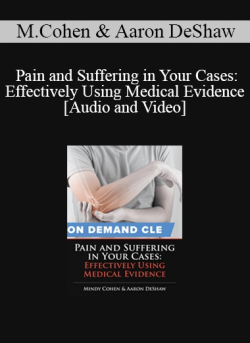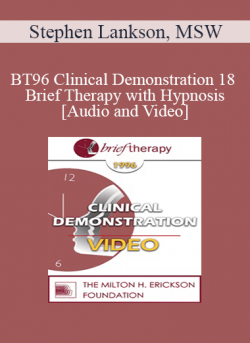[Audio Download] IC19 Short Course 26 – Effective Management of Chronic Anxiety and Depression with Essential Neurobiological Communication – Bart Walsh, MSW
$15.00 Original price was: $15.00.$5.00Current price is: $5.00.
[Instant Download] – You will receive instant download access after the purchase
- Topic Areas:
- Short Course
- Bundles:
- IC19 – All Audio
- Category:
- Erickson Congress | Erickson Congress 2019
- Faculty:
- Bart Walsh, MSW
- Duration:
- 1 Hour 29 Minutes
- Format:
- Audio Only
- Original Program Date :
- Dec 12, 2019
Description
Description:
Chronic anxiety and depression present significant challenges for those affected by these conditions. A behavioral treatment which accesses deep levels of mind-body functioning facilitates remission of these debilitating conditions. This treatment, conceptualized as essential neurobiological communication (ENBC), incorporates a form of body language known as ideomotor signaling. Because these are chronic conditions, the affected individual learns how to fully manage these states on their own. Also presented is a non-invasive, structured protocol for reducing the adverse influence of unresolved emotion on present experience. Essential to this model is a progressive ratification sequence intended to ground emotional adjustments in thought, perception and behavior. This brief procedure is a useful adjunct to other treatment modalities and instrumental in clarifying the focus of treatment. Given adequate time, a demonstration with a volunteer will illustrate this approach.
Educational Objectives:
- Explain the use of ideomotor questioning in resolving emotional experience.
- Describe a method for accessing and quelling the source of chronic anxiety and depression.
- Identify one clinical application of a parts model.
*Sessions may be edited for content and to preserve confidentiality*
Faculty

Bart Walsh, MSW Related seminars and products: 12
Bart Walsh, MSW is a Licensed Clinical Social Worker and Diplomate in Clinical Social Work. He has practiced in the Portland area since 1987, maintaining the highest professional ethical standards. He directs Affinity Counseling and Hypnosis as well as The Milton H. Erickson Institute of Portland. Bart's orientation to counseling, psychotherapy and hypnotherapy is essentially a strengths perspective with a solution focus. The strengths perspective acknowledges all the strengths, resources and instinctual imperatives within an individual that have helped the individual get to the present moment. The strengths perspective helps scan for the resources needed to resolve or modify the concern that is brought to treatment.
Be the first to review “[Audio Download] IC19 Short Course 26 – Effective Management of Chronic Anxiety and Depression with Essential Neurobiological Communication – Bart Walsh, MSW” Cancel reply
Related Products
Medical & Health
Medical & Health
Medical & Health
Medical & Health
Medical & Health
BT96 Clinical Demonstration 18 – Brief Therapy with Hypnosis – Stephen Lankson, MSW

 [Download Now] Van Tharp – How to Develop a Winning Trading System That Fits You
[Download Now] Van Tharp – How to Develop a Winning Trading System That Fits You  Trial Guides - Pain and Suffering in Your Cases: Effectively Using Medical Evidence
Trial Guides - Pain and Suffering in Your Cases: Effectively Using Medical Evidence ![[Audio] IC04 Workshop 11 - Hypnotic Strategies for Obsessive-Compulsive Disorder - Krzysztof Klajs](https://coursewish.com/wp-content/uploads/2021/05/Audio-Only-IC04-Workshop-11-Hypnotic-Strategies-for-Obsessive-Compulsive-Disorder-Krzysztof-Klajs-Dipl.-Psych.-100x100.png)
![[Audio] IC19 Short Course 23 - Clinical Practice of Hypnosis Combined with CBT-I in Treatment of Insomnia - Chenggang Jiang](https://coursewish.com/wp-content/uploads/2021/05/Audio-Only-IC19-Short-Course-23-Clinical-Practice-of-Hypnosis-Combined-with-CBT-I-in-Treatment-of-Insomnia-Chenggang-Jiang-PhD-100x100.png)
![[Audio] IC19 Short Course 26 - Effective Management of Chronic Anxiety and Depression with Essential Neurobiological Communication - Bart Walsh](https://coursewish.com/wp-content/uploads/2021/05/Audio-Only-IC19-Short-Course-26-Effective-Management-of-Chronic-Anxiety-and-Depression-with-Essential-Neurobiological-Communication-Bart-Walsh-MSW.png)
![[Audio] BT06 Clinical Demonstration 10 - Introducing Hypnosis into Psychotherapy - Stephen Lankton](https://coursewish.com/wp-content/uploads/2021/05/Audio-Only-BT06-Clinical-Demonstration-10-Introducing-Hypnosis-into-Psychotherapy-Stephen-Lankton-MSW-DAHB-250x343.png)
![[Audio] BT06 Short Course 36 - Journey Through Midlife: Yours and Your Clients - Are You Ready? - Marilia Baker](https://coursewish.com/wp-content/uploads/2021/05/Audio-Only-BT06-Short-Course-36-Journey-Through-Midlife-Yours-and-Your-Clients-Are-You-Ready-Marilia-Baker-MSW-250x343.png)
![[Audio] BT06 Workshop 34 - Aging and Long-Term Care - Mary Goulding](https://coursewish.com/wp-content/uploads/2021/05/Audio-Only-BT06-Workshop-34-Aging-and-Long-Term-Care-Mary-Goulding-MSW-250x343.png)
![[Audio] BT10 Conversation Hour 01 - Divorce Busting Conversation - Michele Weiner-Davis](https://coursewish.com/wp-content/uploads/2021/05/Audio-Only-BT10-Conversation-Hour-01-Divorce-Busting-Conversation-Michele-Weiner-Davis-MSW-250x343.png)
![[Audio] BT12 Short Course 51 - Effective Management of Chronic Anxiety and Depression with Essential Neurobiological Communication - Bart Walsh](https://coursewish.com/wp-content/uploads/2021/05/Audio-Only-BT12-Short-Course-51-Effective-Management-of-Chronic-Anxiety-and-Depression-with-Essential-Neurobiological-Communication-Bart-Walsh-MSW-1-250x343.png)
![[Audio] BT14 Short Course 24 - Effective Management of Chronic Anxiety and Depression with Essential Neurobiological Communication - Bart Walsh](https://coursewish.com/wp-content/uploads/2021/05/Audio-Only-BT14-Short-Course-24-Effective-Management-of-Chronic-Anxiety-and-Depression-with-Essential-Neurobiological-Communication-Bart-Walsh-MSW-250x343.png)
![[Audio] BT18 Short Course 32 - Effective Management of Chronic Anxiety and Depression with Essential Neurobiological Communication - Bart Walsh](https://coursewish.com/wp-content/uploads/2021/05/Audio-Only-BT18-Short-Course-32-Effective-Management-of-Chronic-Anxiety-and-Depression-with-Essential-Neurobiological-Communication-Bart-Walsh-MSW-250x343.png)
![[Audio] BT93 Clinical Demonstration 17 - Getting Wheels in Motion in Brief Therapy - Stephen Lankton](https://coursewish.com/wp-content/uploads/2021/05/Audio-Only-BT93-Clinical-Demonstration-17-Getting-Wheels-in-Motion-in-Brief-Therapy-Stephen-Lankton-MSW-250x343.png)

![[Audio] IC19 Short Course 26 - Effective Management of Chronic Anxiety and Depression with Essential Neurobiological Communication - Bart Walsh](https://coursewish.com/wp-content/uploads/2021/05/Audio-Only-IC19-Short-Course-26-Effective-Management-of-Chronic-Anxiety-and-Depression-with-Essential-Neurobiological-Communication-Bart-Walsh-MSW-100x100.png)
6 reviews for [Audio Download] IC19 Short Course 26 – Effective Management of Chronic Anxiety and Depression with Essential Neurobiological Communication – Bart Walsh, MSW
There are no reviews yet.